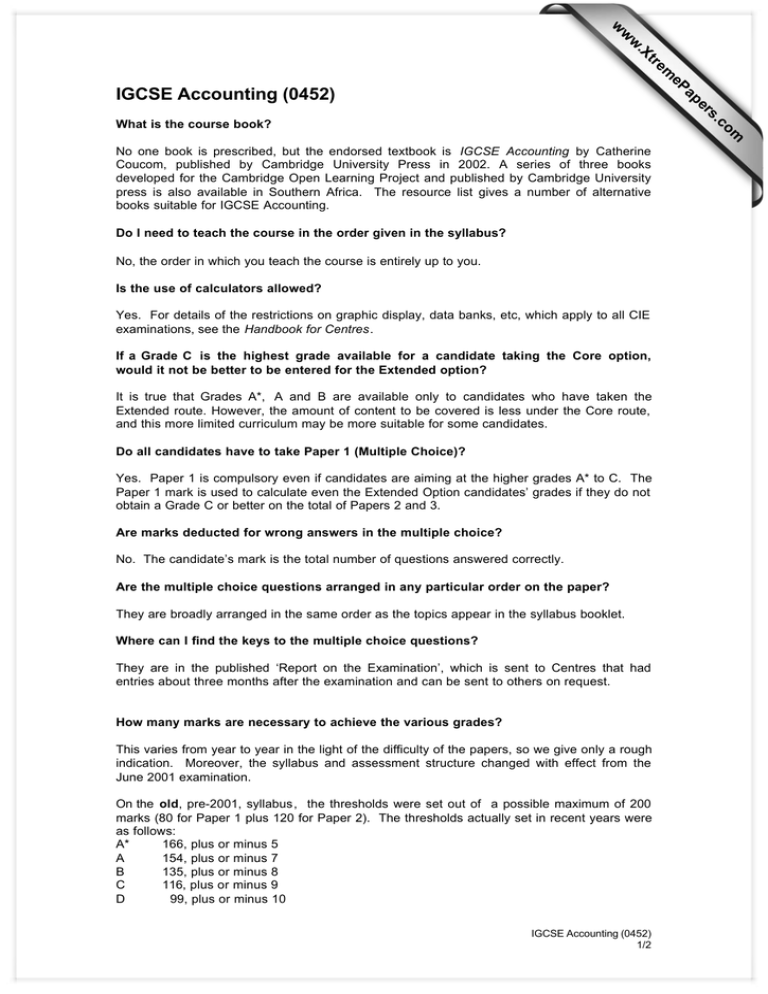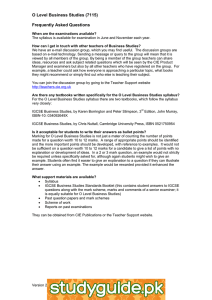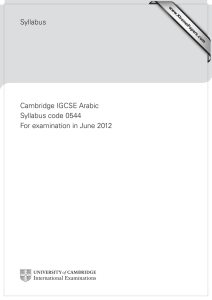IGCSE Accounting (0452) www.XtremePapers.com
advertisement

w w ap eP m e tr .X w IGCSE Accounting (0452) s er om .c What is the course book? No one book is prescribed, but the endorsed textbook is IGCSE Accounting by Catherine Coucom, published by Cambridge University Press in 2002. A series of three books developed for the Cambridge Open Learning Project and published by Cambridge University press is also available in Southern Africa. The resource list gives a number of alternative books suitable for IGCSE Accounting. Do I need to teach the course in the order given in the syllabus? No, the order in which you teach the course is entirely up to you. Is the use of calculators allowed? Yes. For details of the restrictions on graphic display, data banks, etc, which apply to all CIE examinations, see the Handbook for Centres. If a Grade C is the highest grade available for a candidate taking the Core option, would it not be better to be entered for the Extended option? It is true that Grades A*, A and B are available only to candidates who have taken the Extended route. However, the amount of content to be covered is less under the Core route, and this more limited curriculum may be more suitable for some candidates. Do all candidates have to take Paper 1 (Multiple Choice)? Yes. Paper 1 is compulsory even if candidates are aiming at the higher grades A* to C. The Paper 1 mark is used to calculate even the Extended Option candidates’ grades if they do not obtain a Grade C or better on the total of Papers 2 and 3. Are marks deducted for wrong answers in the multiple choice? No. The candidate’s mark is the total number of questions answered correctly. Are the multiple choice questions arranged in any particular order on the paper? They are broadly arranged in the same order as the topics appear in the syllabus booklet. Where can I find the keys to the multiple choice questions? They are in the published ‘Report on the Examination’, which is sent to Centres that had entries about three months after the examination and can be sent to others on request. How many marks are necessary to achieve the various grades? This varies from year to year in the light of the difficulty of the papers, so we give only a rough indication. Moreover, the syllabus and assessment structure changed with effect from the June 2001 examination. On the old, pre-2001, syllabus, the thresholds were set out of a possible maximum of 200 marks (80 for Paper 1 plus 120 for Paper 2). The thresholds actually set in recent years were as follows: A* 166, plus or minus 5 A 154, plus or minus 7 B 135, plus or minus 8 C 116, plus or minus 9 D 99, plus or minus 10 IGCSE Accounting (0452) 1/2 E F G 82, plus or minus 10 61, plus or minus 6 40, plus or minus 2 Is there a Coursework option? No. Does the Centre have to provide multi-column Accounting paper? No. Candidates are expected to answer the questions on Papers 2 and 3 in the spaces provided on the question paper booklet. For Paper 1 (Multiple Choice) they indicate their answers on the special answer sheet which is machine-read. Can we use T account formats? Yes. The syllabus requires candidates to be able to post ledger account entries from the books of prime entry using either the running balance format or the ‘T’ account format. Are there marks for correct workings even if the answer is wrong? Yes. Candidates should always show their workings. Are the mark schemes published? Yes, from the November 2000 examination onwards. They are available for purchase from CIE Publications. IGCSE Accounting (0452) 2/2

